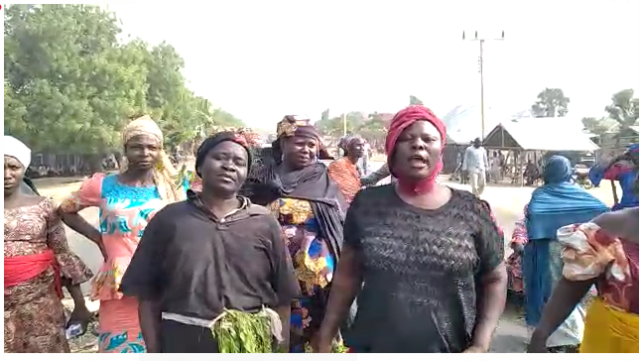By NNasir Elrufai
- It is an understatement to say that Nigeria is in one of its most difficult moments. The genuine fears for their lives and property felt by many citizens across the country need to be assuaged, along with urgent steps to stop the attacks, relieve human misery and rebuild collective trust and will to jointly confront and defeat the criminals that menace us all.
- This moment of peril is compounded by an avalanche of extreme rhetoric, ethnic profiling and fake news that only ignite passion without comforting the afflicted, nor offering a way out. Leaders and all responsible persons must show compassion to our compatriots that have been affected while calming nerves. Banditry is a national problem, with victims from all parts of the country, and we should address it with a common resolve and not further delight the felons by letting them divide us.
- It is regrettable that banditry has been allowed to develop a nationwide footprint. In 2015, we in Kaduna State inherited a crime mix of mainly rural banditry, cattle rustling and kidnapping, along with the menace of urban gangs. In parts of the southern senatorial district of the state, communal clashes with ethno-religious complications have been the norm for over three decades. Many livestock holders and farmers had abandoned their farms, either because the bandits had stolen their assets or out of fear for their lives.
- We identified the Kamuku-Kuyambana forest range, running from Niger State through Birnin-Gwari in Kaduna State and across most of the NorthWest states, as the major bandit enclave. We initiated discussions with our neighbours and the governors developed a shared appreciation of the problem and decided to try and solve it. With remarkable unanimity, the governors of the North-West states and Niger State jointly provided the funding of a military operation for which the Federal Government committed its military assets.
- The military operations in the Birnin Gwari axis decimated the bandits and heralded a massive reduction in cattle rustling. But the relief proved sadly momentary. With the military operations not becoming continuous or simultaneous in all states, the bandits regrouped and intensified kidnappings in rural communities, highways and on the fringes of major population areas. Banditry is badly hurting our rural economy, driving farmers off the land, stealing their cattle, kidnapping them and their families for ransom, and often killing them.
- About a third of our 23 local governments are affected by these crimes. The locus of banditry in the last 15 months has been in the northern and central senatorial districts of our state. Bandits have also complicated the communal clashes that blighted lives in parts of the southern Kaduna senatorial district in the latter half of 2020. Thanks to some courageous leadership at the grassroots, a community-based peace process in Zangon-Kataf and Jema’a local government areas is helping to reduce communal tensions and incline the communities towards exclusively peaceful way of resolving differences.
- I am telling the story of our experience in Kaduna State to remind everyone that our people are victims of these criminals and illustrate that we feel the pains of victims in other parts of the country. Our experience also teaches us a few things which should inform our responses:
i. The Nigerian state has not jealously and consistently protected its prerogatives and status as the leviathan, the ultimate guarantor of security, the protector of rights and the promoter of the rule of law. That is why its power is being challenged, in a frighteningly sustained manner by a phalanx of armed non-state actors.
ii. Our national level security response to these challenges has been uncoordinated and ineffective in wiping out the threats. None of the military services nor other security agencies has been suitably expanded in numbers and equipment for over a decade since the insurgency in the North-East pushed things to a new low. This country does not have enough soldiers, uniformed police and secret police to project state power across its vast swathes, particularly the forests. The limited number of boots on the ground are not well equipped and are significantly lacking in the technology that can make their limited numbers matter a lot less.
iii. The justice system operates with ethos and at a pace that do not reflect the fragility of the situation and the urgency to demonstrate that the rule of law is meaningful. Prosecutions take so long that many citizens assume that the criminals have long been released, encouraging criminal conduct, and raising the dangerous appeal of illegal self-help.
iv. The subnational levels – that is the states and local governments combined – have limited hard power but considerable options and scope for the exercise of soft-power which require for its effectiveness the looming shadow of credible coercive power;
v. Notions of a common humanity, not to talk of a common citizenship are not as widely or deeply shared as it would appear. Identity politics holds sway. This reflects the absence of an elite consensus about who we are and how we should live together.
- We can overcome these debilitations. Nigeria is not the only diverse country in the world; neither are we the only federation. We are not the only country cobbled together by accidents of history. We are more integrated than we think, and there are many shared stories of triumph and tragedy. There are fault-lines, but we can be rational about managing and navigating them; we can be conscious and deliberate about overcoming some of them while rendering those that remain less toxic.
- In Kaduna State, we are implementing a project that conceives livestock production as a viable business, rather than a culture. We are working with a global dairy giant Arla of Denmark to deliver a project that sedentarises herders, in a community with roads, veterinary clinics, schools and health facilities. Arla of Denmark is the commercial and technical manager of this project, called the Damau Milk Project, based in one of our 14 grazing reserves located in Kubau local government area. This project would deliver better life chances for the herders, create new businesses and remove a perennial source of conflict. We hope to replicate this project across more of the grazing reserves in the state.
- In my view, we must approach organising our country as a deliberate task, beginning with a collective decision regarding what sort of society we intend to be and the means of attaining it. That collective decision manifests in elite consensus, and it would include an understanding of the medley of measures required to make it happen. It may involve a set of drastic actions to signal a firm direction and some more medium to long term measures that require patient nurturing. Based on elite consensus, managed under the leadership of Deng Xiaoping, China went in 40 years from poverty to first world status, lifting hundreds of millions out of poverty and making the country the second largest economy in the world.
- Nigeria does not have to remain mired in an identity bind. Rather than leaving its peoples moored to the past, we can create a shared vision of a new future. We require an elite consensus to take the poison out of identity politics and emphasise personal qualities, including competence, application and responsibility. We must be pragmatic in economic and political choices, choosing what is efficient above what is popular, caring more for results than the drama of ethno-religious entrepreneurs.
Elite consensus must include agreement on the following:
i. Commitment to the Rule of law and quick dispensation of justice;
ii. Common citizenship;
iii. Meritocracy and equal opportunity
iv. Prioritisation of human development;
v. Respect for diversity and protection of citizenship rights guaranteed by the Constitution;
vi. Devolution of powers to return the nation to the true federation of our founding fathers.
- The APC Committee on True Federalism proposed significant devolution of powers between the national government and the 36 States. We recommended that about 10 items be transferred from the Exclusive to the Concurrent List and therefore fall under the control of both the states and federal government. I will dwell on three of the issues that I believe are critical to the immediate needs of the country to pull back from the brink:
a. Imperative for Federal, State and Community Police;
b. Vesting control of Oil and Gas, Mines and Minerals (other than offshore in the Continental Shelf and Extended Economic Zone) in the States with royalties and taxes payable to the Federation Account, and
c. Rectifying the anomaly of a federation that has a more or less unitary judiciary. - I am firmly convinced that restructuring on the lines proposed by our committee is a nation-building opportunity. It would allow states that states to exercise consequential powers, assume more responsibilities and control resources to enable them deliver better outcomes for those they govern.
Conclusion:
- In addition to, and in line with the foregoing points, I will conclude by recommending the following immediate decisions and actions by the federal and state governments, with the support of our civil society and all well-meaning Nigerians:
i. Implement the three key devolution proposals outlined above. Give us state police now. Vest all minerals in the states now, and decentralise our judiciary now, not later.
ii. Be emphatic about the right of every citizen to security, freedom of movement and rights of residence, and that the choice of livelihoods must conform to the laws of the land;
iii. Identify, focus on and deal decisively with all state and non-state actors engaged in conduct that amounts to challenging the supremacy of the Nigerian state and our Constitution without ethnic profiling or discriminatory treatment;
iv. Provide immediate and enhanced funding to acquire advanced equipment, armament and ordinance for the armed forces, police, security and paramilitary agencies by drawing down from various ‘rainy day’ federation funds;
v. Implement the national livestock transformation plan already produced four years ago to enable accelerated investment in modern animal husbandry incorporating the rapid sedentarisation of herders in known locations;
vi. Aggressive reduction of the cost of governance at federal, state and local government levels through merger of MDAs with similar mandates and functions, and a nationwide freeze on creation of any new administrative, regulatory or executive bodies for the foreseeable future;
vii. Forge national consensus now, not later, to collect more taxes at both Federal and State levels to be viable. This means we must stop pretending that the regulated levels of monetary policy rates, exchange rate, prices of petrol and electricity, and salaries of the public sector are realistic, sustainable and will lead us to the promised land.
- As leaders, our obligation is to turn Nigeria’s moment of peril into a breakthrough moment, a time to stand together and drag the Nigerian state to modernity, imbued with a capacity to exercise robust control of security, that is uncompromising in its prerogatives and has an ability to protect rights, lives and livelihoods. Let us make a rational decision that we would be defined by what we achieve in common.
Nasir Ahmad El-Rufai, OFR
Governor of Kaduna State
Lagos, Nigeria
Remarks by Malam Nasir El-Rufai, Governor of Kaduna State, at the national conversation; The Fierce Urgency of Now: Tactics and Strategies to Pull Nigeria from the Brink, held in Lagos on Friday, 19th February 2021





